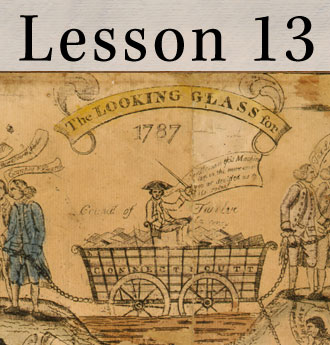Lesson 13: What Was the Anti-Federalist Position in the Debate about Ratification?
Locke, John (1632-1704) John Locke, a physician and philosopher, worked with famous scientists, including Robert Boyle and Robert Hooke. In contrast to Hobbes, Locke used state of nature and social contract theory to justify limited government and the preservation of individual rights, particularly life, liberty, and property. Locke is sometimes called "America's philosopher" because his Second Treatise of Government (1690) was widely read by the colonists and important ideas found in it (as well as in works of English republican writers) are found in the Declaration of Independence, especially his theories of natural rights and his defense of violent revolution after "a long train of abuses" of power by rulers. Two verbatim phrases of Locke's are found in the Declaration.
Madison, James (1751-1836) The "Father of the Constitution" was born to a wealthy Virginia family. He was taught at home and in private schools, then graduated from the College of New Jersey. While deciding whether to become a lawyer or minister, Madison became involved in the revolutionary cause, thereby entering state and local politics. His poor health kept him from serving in the military. In 1780, Madison was chosen to serve in the Continental Congress, where he played a major role. He was one of the most influential voices calling for a constitutional convention. He came to the Philadelphia Convention with a plan for the new government, took extensive notes on the proceedings, spoke more than 150 times, and worked tirelessly on various committees. As one of the authors of The Federalist, Madison was also a key figure in the battle for ratification. Following the convention, Madison served as a member of the U.S. House of Representatives, helping to frame the Bill of Rights and organize the executive department. Under Jefferson, Madison served as secretary of state. He then succeeded Jefferson as president. In retirement, Madison continued to speak out on public issues.
Martin, Luther (1748-1826) Luther Martin was born in New Jersey around 1748. After graduating from the College of New Jersey, he moved to Maryland where he began practicing law. He served as state attorney general and in the Continental Congress. At the Philadelphia Convention, he opposed increasing the power of the federal government. Martin believed in the rights of the states and of the people and wanted each state to have an equal vote in Congress. He also wanted a bill of rights. Although he owned six slaves, Martin opposed slavery, speaking out against it. Because he lost the battles on the issues he thought were important, Martin left the convention and did not sign the Constitution. He fought against ratification in Maryland. After 27 years in office, Martin resigned as Maryland attorney general in 1805. He served in several other positions, but returned as attorney general in 1818.
Warren, Mercy Otis (1728-1814) An author and Anti-Federalist, she knew most of the Revolutionary leaders personally and spent much of her life at the center of events. Her vantage point, combined with her literary talents, made her a well-known historian and poet. She wrote several plays and a three-volume history of the Revolution.
Yates, Robert (1738-1801) Yates was born and educated in New York. He became a lawyer and set up practice in Albany. He spent the greatest amount of time as a justice of the New York Supreme Court, serving eight years as chief justice. Yates left the Philadelphia Convention because he believed it had exceeded its authority. A strong Anti-Federalist, he worked against ratification, writing several essays attacking the document. Yates kept notes of the convention which have been useful to historians.






